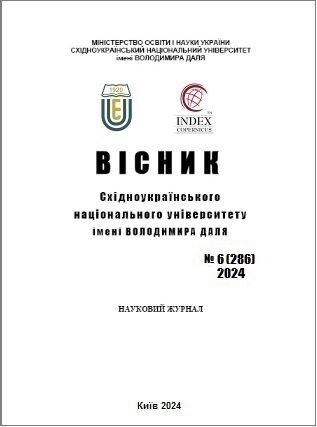The impact of digitalization on the development of social transfers in the public finance system
DOI:
https://doi.org/10.33216/1998-7927-2024-286-6-7-14Keywords:
public finance, public finance system, dialectics of social transfers, social transfers, budget, financial provision, finance, digitalization, digital economy, digital technologies, transformations, transformational changesAbstract
Digitalization significantly affects the development of social transfers in the public finance system, as the latest technologies create new opportunities for managing public spending and distributing financial resources among socially vulnerable segments of the population. The introduction of digital platforms, the use of big data, artificial intelligence and automated systems allows reducing the costs of administrative procedures, increasing the accuracy of targeted payments and ensuring transparency in the distribution of finances. Digital tools also contribute to improving monitoring and control over the effectiveness of social transfers, which allows reducing the level of errors and abuses. One of the main advantages of digitalization is the possibility of quick and unhindered access to social payments, which makes the system more efficient and fair. In addition, digitalization allows facilitating the processes of providing state aid, reducing the time for processing applications and improving the level of service to citizens. At the same time, important aspects are the need to ensure cybersecurity, personal data protection and access to technologies for all segments of the population, including the most vulnerable categories of citizens. The purpose of this article is to determine the specifics of the impact of digitalization on the development of social transfers in the public finance system. The methods used in the work: logical method, induction and deduction methods, analysis and synthesis methods, generalization method, comparison method, observation method, graphical method for presenting the results of the study. The introduction of digital technologies allows to optimize the processes of providing social benefits, reduce administrative costs, and ensure the accuracy and timeliness of the distribution of financial resources among the population. Thanks to the use of big data, automated systems and digital platforms, states can better address social transfers based on the current needs of citizens, which contributes to increasing the fairness and effectiveness of social policy. However, despite the numerous advantages, it is important to pay attention to the issues of cybersecurity, personal data protection and the availability of digital services for all segments of the population, in particular for socially vulnerable groups. Thus, the digitalization of social transfers in public finances can become an important tool for improving the well-being of citizens and ensuring a more efficient and fair use of public funds. However, for the successful implementation of this strategy, it is necessary to take into account both technological and social aspects, ensuring equal access to digital services for all citizens.
References
1. Desyatnyuk, O., Muravskyi, V., Shevchuk, O., Oleksiiv, M. Dual use of Internet of Things technology in accounting automation and cybersecurity // 12 th International Conference on Advanced Computer Information Technologies, ACIT 360–363 (2022). DOI: 10.1109/ACIT54803.2022.9913080, URL: https://www.scopus.com/record/display.uri?eid=2-s2.0-85141153727&origin=resultslist&sort=plf-f
2. Крисоватий А., Десятнюк О., Птащенко О. Digital inclusion: financial and marketing aspects. Журнал стратегічних економічних досліджень, № 3(14), 2023. - С. 93-102. https://econ-vistnyk.knutd.edu.ua/wp-content/uploads/sites/17/2023/08/3-2023-10.pdf. DOI: 10.30857/2786-5398.2023.3.10
3. Мальований М.І. Фінансові аспекти функціонування системи соціального захисту населення в Україні: Монографія. Умань: СПД Сочінський, 2016. 496 с.
4. Мальований М. Теоретичні основи забезпечення соціального захисту. Формування ринкових відносин в Україні. 2012. № 5/1(132). С. 174-185.
5. Огінська А.Ю. Соціальний захист населення та фінансовий механізм його реалізації: теоретикоконцептуальний зріз. Економіка та держава: науково-практичний журнал / Ін-т підготовки кадрів держ. служби зайнятості України; ТОВ «Ред. журн. «Економіка та держава». Київ, 2018. № 4, квітень. C. 131-136.
6. Клименко А.Л. Соціальний захист і соціальне забезпечення в умовах євроінтеграції України: окремі аспекти. Теорія і практика правознавства. 2017. Вип. 2 (12). С. 1-10.
7. Achilova, K. (2024). The impact of digital technologies of public financial management: efficiency analysis and development prospects. International Scientific Journal, 3, 207-213.
8. Damon, J. (2016). The socio-economic impact of social security. Geneva: International Social Security Association, 42.
9. Desyatnyuk, O., Naumenko, M., Lytovchenko, I., Beketov, O. (2024). Impact of Digitalisation on International Financial Security in Conditions of Sustainable Development. Problemy Ekorozwoju/Problems of Sustainable Development, 1, 104-114. https://ph.pollub.pl/index.php/preko/article/view/5325/4341.
10. Desyatnyuk, O., Krysovatyy, A., Ptashchenko, O. and Kyrylenko, O. (2024). Financial Security in the Conditions of Globalisation: Strategies and Mechanisms for the Protection of National Interests. Econ. Aff., 69, 261-268. https://ndpublisher.in/admin/issues/EAv69n1z1.pdf
11. Gavkalova, N., Akimova, L., Zilinska, A., (...), Avedyan, L., Akimov, O. (2022). Functioning of united territorial communities and identifications of main problems of organisational support of local budget management. Financial and Credit Activity: Problems of Theory and Practice, 2(43), 107-117 (in Ukrainian)
12. Komarova, O. (2009). Functional purpose of social transfers under the conditions of transformation societies. Social policy, 3, 75-82 (in Ukrainian).
13. Krysovatyy, A., Ptashchenko, O., Kurtsev, O., Arutyunyan, O. (2024). The Concept of Inclusive Economy as a Component of Sustainable Development. Problemy Ekorozwoju/Problems of Sustainable Development, 1, 164-172. https://ph.pollub.pl/index.php/preko/article/view/5755/4346.
14. Krysovatyy, A., Desyatnyuk, O., & Ptashchenko, O. (2024). Digital Innovations and their Ramifications for Financial and State Security. AFRICAN JOURNAL OF APPLIED RESEARCH, 10(1), 431-441. https://doi.org/10.26437/ajar.v10i1.713
15. Kuybida, V., Savitska, S., Shkoda, M. and 3 more (...) (2023). Methodology of development of social investment projects for the economy: legal aspects. Journal of Law and Sustainable Development, 11(4) (in Ukrainian)
16. Державна служба статистики України. https://www.ukrstat.gov.ua/

